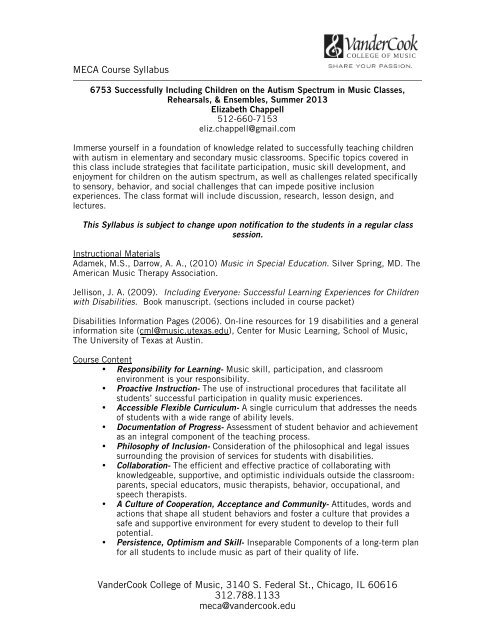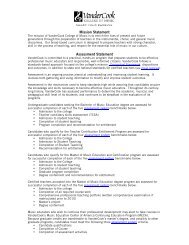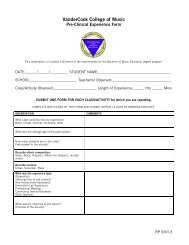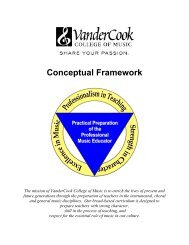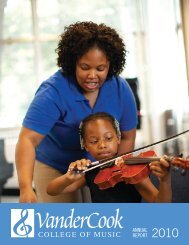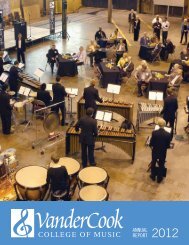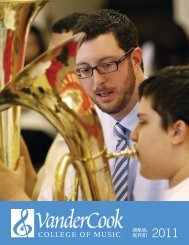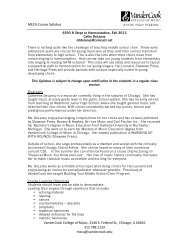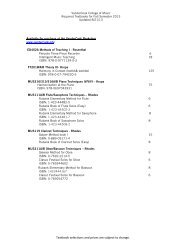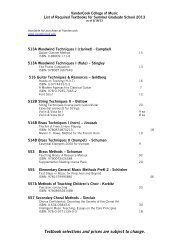MECA Course Syllabus VanderCook College of Music, 3140 S ...
MECA Course Syllabus VanderCook College of Music, 3140 S ...
MECA Course Syllabus VanderCook College of Music, 3140 S ...
You also want an ePaper? Increase the reach of your titles
YUMPU automatically turns print PDFs into web optimized ePapers that Google loves.
<strong>MECA</strong> <strong>Course</strong> <strong>Syllabus</strong><br />
6753 Successfully Including Children on the Autism Spectrum in <strong>Music</strong> Classes,<br />
Rehearsals, & Ensembles, Summer 2013<br />
Elizabeth Chappell<br />
512-660-7153<br />
eliz.chappell@gmail.com<br />
Immerse yourself in a foundation <strong>of</strong> knowledge related to successfully teaching children<br />
with autism in elementary and secondary music classrooms. Specific topics covered in<br />
this class include strategies that facilitate participation, music skill development, and<br />
enjoyment for children on the autism spectrum, as well as challenges related specifically<br />
to sensory, behavior, and social challenges that can impede positive inclusion<br />
experiences. The class format will include discussion, research, lesson design, and<br />
lectures.<br />
This <strong>Syllabus</strong> is subject to change upon notification to the students in a regular class<br />
session.<br />
Instructional Materials<br />
Adamek, M.S., Darrow, A. A., (2010) <strong>Music</strong> in Special Education. Silver Spring, MD. The<br />
American <strong>Music</strong> Therapy Association.<br />
Jellison, J. A. (2009). Including Everyone: Successful Learning Experiences for Children<br />
with Disabilities. Book manuscript. (sections included in course packet)<br />
Disabilities Information Pages (2006). On-line resources for 19 disabilities and a general<br />
information site (cml@music.utexas.edu), Center for <strong>Music</strong> Learning, School <strong>of</strong> <strong>Music</strong>,<br />
The University <strong>of</strong> Texas at Austin.<br />
<strong>Course</strong> Content<br />
• Responsibility for Learning- <strong>Music</strong> skill, participation, and classroom<br />
environment is your responsibility.<br />
• Proactive Instruction- The use <strong>of</strong> instructional procedures that facilitate all<br />
students’ successful participation in quality music experiences.<br />
• Accessible Flexible Curriculum- A single curriculum that addresses the needs<br />
<strong>of</strong> students with a wide range <strong>of</strong> ability levels.<br />
• Documentation <strong>of</strong> Progress- Assessment <strong>of</strong> student behavior and achievement<br />
as an integral component <strong>of</strong> the teaching process.<br />
• Philosophy <strong>of</strong> Inclusion- Consideration <strong>of</strong> the philosophical and legal issues<br />
surrounding the provision <strong>of</strong> services for students with disabilities.<br />
• Collaboration- The efficient and effective practice <strong>of</strong> collaborating with<br />
knowledgeable, supportive, and optimistic individuals outside the classroom:<br />
parents, special educators, music therapists, behavior, occupational, and<br />
speech therapists.<br />
• A Culture <strong>of</strong> Cooperation, Acceptance and Community- Attitudes, words and<br />
actions that shape all student behaviors and foster a culture that provides a<br />
safe and supportive environment for every student to develop to their full<br />
potential.<br />
• Persistence, Optimism and Skill- Inseparable Components <strong>of</strong> a long-term plan<br />
for all students to include music as part <strong>of</strong> their quality <strong>of</strong> life.<br />
<strong>VanderCook</strong> <strong>College</strong> <strong>of</strong> <strong>Music</strong>, <strong>3140</strong> S. Federal St., Chicago, IL 60616<br />
312.788.1133<br />
meca@vandercook.edu
<strong>MECA</strong> <strong>Course</strong> <strong>Syllabus</strong><br />
<strong>Course</strong> Learning Objectives<br />
By the end <strong>of</strong> the week, you will be able to do each <strong>of</strong> the following in a limited context:<br />
• Identify meaningful music goals and activities that are important for all<br />
students now and throughout their adult lives.<br />
• Describe the abilities and deficits associated with autism spectrum disorders<br />
and how these behaviors may or may not affect participation and skill<br />
development.<br />
• Describe elements in the learning environment that may affect student<br />
learning and behavior.<br />
• Plan hierarchical sequences <strong>of</strong> student behavior directed toward desired goals.<br />
• Develop practical techniques for the ongoing assessment <strong>of</strong> individual student<br />
behavior.<br />
• Develop proactive strategies toward fostering appropriate social and musical<br />
goals for all students.<br />
• Develop strategies for successfully including children with autism spectrum<br />
disorders into music activities with typical peers.<br />
• Develop plans for pr<strong>of</strong>essional growth in areas <strong>of</strong> knowledge related to this<br />
course.<br />
<strong>MECA</strong> courses and ISBE Standards<br />
<strong>MECA</strong> courses, by their very nature and design, address the ISBE <strong>Music</strong> Content and<br />
Pr<strong>of</strong>essional Teaching Standards throughout the course content. <strong>Music</strong> technology<br />
courses also incorporate the ISBE Technology Standards.<br />
<strong>VanderCook</strong> Candidate Outcomes Addressed<br />
The outcomes that the <strong>College</strong> strives to develop in its teacher candidates were derived<br />
from the institution’s Conceptual Framework and are expressed in its core dispositions.<br />
This course addresses the following Candidate Outcomes:<br />
1. A high level <strong>of</strong> musicianship<br />
2. Academic ability and diligence leading to a lifetime <strong>of</strong> learning<br />
3. Skill in the process <strong>of</strong> teaching<br />
4. Self-discipline and persistence<br />
5. Interpersonal and intrapersonal skills<br />
6. Good citizenship and personal integrity<br />
7. Building pragmatic links with educational programs in diverse communities<br />
8. Pr<strong>of</strong>essionalism in action word, and appearance<br />
<strong>Course</strong> Requirements and Exit Assessment<br />
1. Complete a Task Analysis related to music specifying all component behaviors with an<br />
action verb. (details to be discussed in class). Be specific. You will have time to discuss<br />
your list <strong>of</strong> behaviors with another member <strong>of</strong> the class, considering the order and<br />
consequence <strong>of</strong> omitting specific tasks. Reorganize your plans into one task analysis<br />
specifying essential components <strong>of</strong> the final behavior. These task analyses will be<br />
included and/or referenced in your access plan (see #3 below)<br />
2. Personal Applications. Consider the material from the book and manuscript chapter<br />
readings and comment on ideas in relation to your own thoughts and experiences as a<br />
teacher, learner, and citizen. Write at least two thoughtful, meaningful, and logical<br />
questions/comments that were generated as a result <strong>of</strong> your reading.<br />
<strong>VanderCook</strong> <strong>College</strong> <strong>of</strong> <strong>Music</strong>, <strong>3140</strong> S. Federal St., Chicago, IL 60616<br />
312.788.1133<br />
meca@vandercook.edu
<strong>MECA</strong> <strong>Course</strong> <strong>Syllabus</strong><br />
3. Access Plan. Over the course <strong>of</strong> the week while working in a small group, you will:<br />
describe a student with autism to be included in your ensemble or classroom (physical<br />
needs, strengths and accomplishments, preferences and interests); list related services<br />
and support; describe the routine and physical characteristics <strong>of</strong> the teaching<br />
environment in which he or she will be included; list music and social goals for the entire<br />
class; list required task analyses which address these goals; describe curricular and<br />
classroom activities that address these goals; describe the instructional format; consider<br />
the socio-emotional climate <strong>of</strong> the class; consider information to be gathered through<br />
collaboration; consider long term music goals for this student; describe methods <strong>of</strong><br />
assessment; and determine supplementary learning goals embedded in the music<br />
activities. Discuss and design aspects <strong>of</strong> a music program that can be accessible to this<br />
child by using strategies that involve the entire class, and a behavior plan that addresses<br />
individual excesses and deficits. Use the CML website, books, findings from research, or<br />
materials available from class as references.<br />
Forms and examples for each <strong>of</strong> the sections for your Access Plan will be discussed in<br />
class. Drafts for some sections will be developed and discussed throughout the week.<br />
4. Each student will prepare a brief Summary and Reflection <strong>of</strong> gains in skill and<br />
knowledge and describe plans for pr<strong>of</strong>essional growth in areas <strong>of</strong> knowledge related to<br />
this course.<br />
Grading Scale<br />
A = 90-100<br />
B = 80-89<br />
C = 70-79<br />
D = 60-69<br />
F = 59 & below<br />
• 10% Task Analysis<br />
• 15% Personal Applications<br />
• 30% Access Plan<br />
• 15% Summary Reflections<br />
• 30% Participation<br />
Attendance and Conduct<br />
Attendance at all classes for the full day is required. A student's grade will be reduced by<br />
one letter grade for each half-day that the student misses. If a student is absent for any<br />
portion <strong>of</strong> either the morning or afternoon session, it is viewed as a half-day absence.<br />
All students must sign all attendance sheets for each course. An attendance sheet will<br />
be distributed each morning shortly after class begins and each afternoon shortly before<br />
dismissal. If a student does not sign an attendance sheet, the assumption will be made<br />
that a half-day absence has occurred for the sheet not signed.<br />
Please silence cell phones during class lecture or discussion.<br />
<strong>VanderCook</strong> <strong>College</strong> <strong>of</strong> <strong>Music</strong>, <strong>3140</strong> S. Federal St., Chicago, IL 60616<br />
312.788.1133<br />
meca@vandercook.edu
<strong>MECA</strong> <strong>Course</strong> <strong>Syllabus</strong><br />
Academic Honesty<br />
Candidates are expected to maintain the highest standards <strong>of</strong> integrity in their academic<br />
work. Failure to do so will jeopardize a candidate’s success in the program. Examples <strong>of</strong><br />
academic dishonesty include:<br />
• Presenting another’s words, music, or concepts as your own by failing to<br />
acknowledge or properly cite the source.<br />
• Communicating or receiving answers or information to/from another in a testing<br />
situation.<br />
• Consulting notes or any other source <strong>of</strong> answers/information in a testing situation,<br />
unless the instructor authorizes such access.<br />
• Making available or accessing tests or quizzes from current or previous classes<br />
unless explicitly authorized by the instructor.<br />
• Bringing, by any means, answers or information into a testing situation except as<br />
explicitly authorized by the instructor.<br />
• Collaborating or turning in jointly produced work on any test or assignment that is<br />
intended to reflect individual effort.<br />
Plagiarism<br />
Plagiarism means taking someone else’s words, ideas, data or work and presenting them<br />
as your own. This could mean an exact duplication <strong>of</strong> someone else’s work without<br />
proper citation <strong>of</strong> the source, or it could mean you present it with only small changes and<br />
do not cite the source. Plagiarism can occur in art, music, literature, or technology –<br />
really in any area <strong>of</strong> intellectual work.<br />
All work submitted should be properly credited to the original source <strong>of</strong> the information or<br />
idea whether the source is a book, Internet site, article, or any other medium. In written<br />
work, quotation marks or block indentations show direct quotations and the source must<br />
be cited. If information that is not common knowledge is paraphrased or summarized<br />
from a source, that source (including websites) must be cited. Failure to do so in<br />
academic assignments represents cheating and carries the appropriate penalties.<br />
Copyright compliance is the goal <strong>of</strong> <strong>VanderCook</strong> <strong>College</strong>. Information to help with<br />
clarification <strong>of</strong> what constitutes fair use <strong>of</strong> copyrighted material, including photocopying,<br />
is on permanent reserve in the Ruppel Library.<br />
No candidate should expect to receive a passing grade on any test or assignment that<br />
reflects dishonesty or academic irregularity. Cheating in any form may result in failure <strong>of</strong><br />
the class and academic expulsion.<br />
Disability Statement<br />
If a student has a disability which might interfere with that student’s ability to function in<br />
this course it is the responsibility <strong>of</strong> that student to notify the instructor at the beginning<br />
<strong>of</strong> the course.<br />
<strong>VanderCook</strong> <strong>College</strong> <strong>of</strong> <strong>Music</strong>, <strong>3140</strong> S. Federal St., Chicago, IL 60616<br />
312.788.1133<br />
meca@vandercook.edu


